Uncover the tales of seven formidable foes that challenged Israel in biblical times, shaping its destiny and legacy.
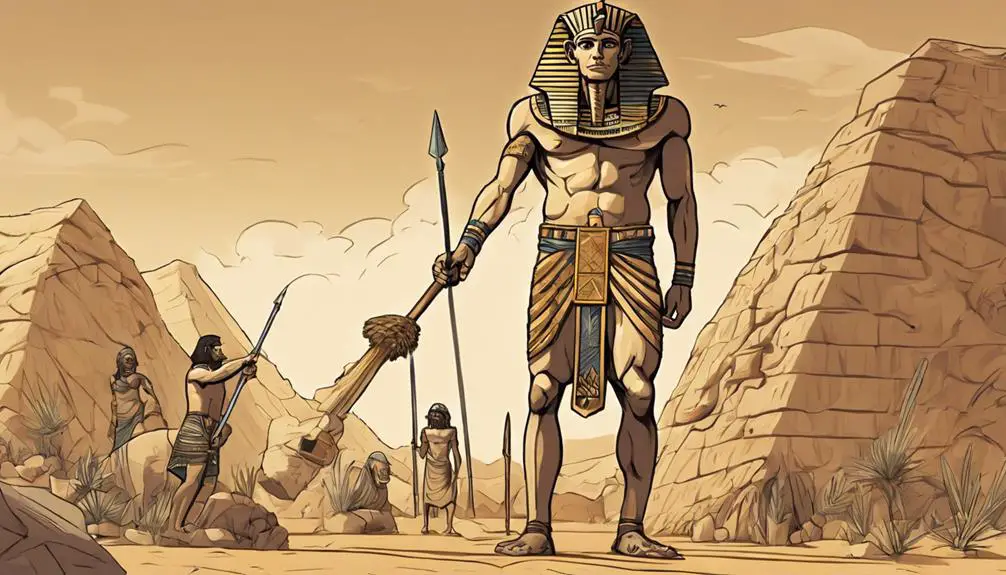
7 Enemies of Israel in the Bible
When you think about the biblical narrative, the confrontation between David and Goliath immediately comes to mind, showcasing the perennial struggle between Israel and its formidable foes.
From the relentless raids by the Amalekites to the strategic sieges laid by the Assyrians, these enemies have shaped the course of Israelite history in profound ways.
As you explore these ancient conflicts, you'll uncover how these adversarial relationships influenced not just military tactics but also the cultural and religious evolution of the region.
This journey into the past promises to reveal insights that remain relevant in understanding the complexities of modern geopolitical landscapes.
Key Takeaways
- Biblical enemies like the Philistines and Babylonians played crucial roles in shaping Israel's history and identity.
- Conflicts with adversaries such as the Canaanites and Amalekites are central themes in the Bible, illustrating territorial and spiritual battles.
- The stories of sieges and captivities, especially by the Assyrians and Babylonians, highlight moments of crisis and transformation for Israel.
- Israel's interactions with neighboring entities like the Moabites and Edomites reveal the complexities of ancient geopolitics and faith-based disputes.
The Philistines and Goliath
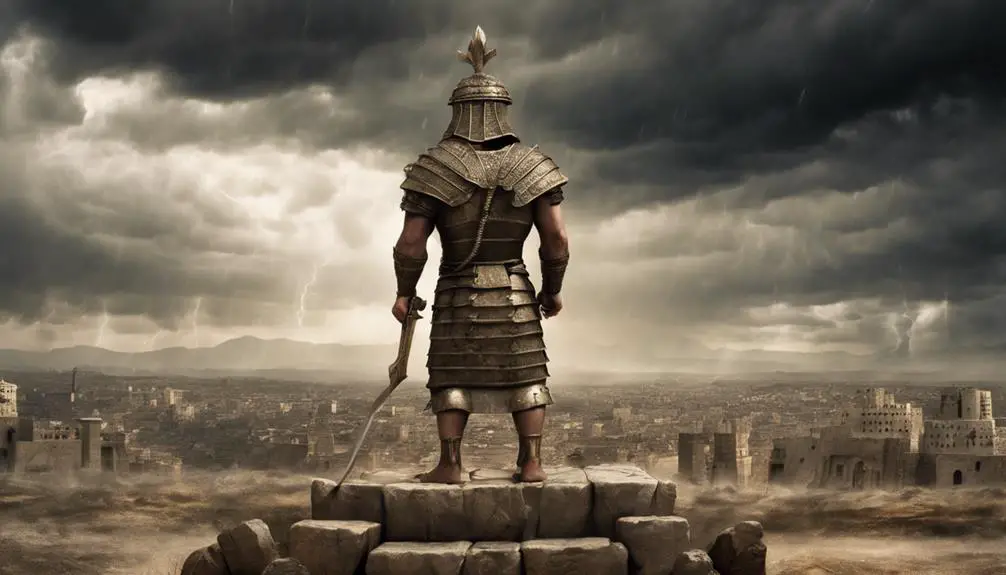
Among the most formidable adversaries of Israel in the biblical narrative, the Philistines and their champion Goliath stand out for their significant military threat and the pivotal role they play in the development of Israel's early monarchy. David's duel with Goliath isn't just a tale of individual heroism; it's a critical moment that highlights the clash between two distinct cultures and military strategies.
The Philistines, originating from the Aegean region, brought with them advanced metallurgy and military tactics that posed a considerable challenge to the Israelites. Their culture was marked by fortified cities, complex political structures, and a pantheon that was distinct from the monotheistic beliefs of Israel. Goliath, as a symbol of Philistine power, represented not only a physical but also a cultural and religious challenge.
David's victory over Goliath, therefore, was a turning point. It wasn't merely a military triumph; it was a statement about the superiority of Israel's faith and divine backing over the Philistine culture. This event set the stage for the eventual dominance of Israelite kingship and marked the decline of Philistine influence in the region.
The Egyptian Pharaohs
The Egyptian Pharaohs, as depicted in the biblical narrative, represent a complex period of interaction and conflict with Israel, embodying both oppression and pivotal moments of change. You'll see that the Pharaohs' role shifts from oppressors, during the Israelites' enslavement, to unintentional catalysts for the showcasing of divine power through Nile miracles. These events set a backdrop for a profound exploration of power dynamics and faith.
Analyzing the narrative, you encounter Joseph's rise to prominence within Egyptian society. This phenomenon isn't just a tale of personal success but a pivotal moment of cross-cultural interaction that had lasting impacts on Israel's history. Joseph's ascent, from prisoner to Pharaoh's advisor, underscores the complexity of Israel's relationship with Egypt, highlighting themes of providence and survival against the odds.
The Egyptian Pharaohs, therefore, aren't merely antagonists in the biblical story; they're instrumental in the unfolding of Israel's history. Their actions, from Joseph's elevation to the initiation of the Exodus through the Nile miracles, illustrate a multifaceted relationship that shaped the identity and destiny of the Israelite people.
The Amalekites' Raids
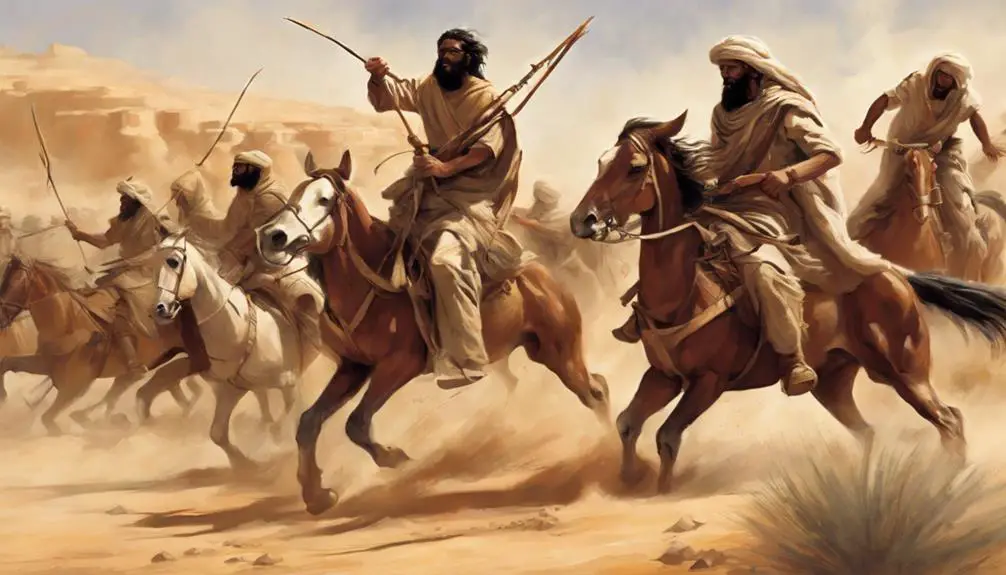
Shifting focus to another significant adversary, Israel's confrontations with the Amalekites, particularly their raids, mark a critical chapter in the biblical narrative of survival and conflict. The Amalekites' assaults during Israel's desert wanderings embody a profound challenge to the nascent Israelite community, testing their resilience and faith. These encounters aren't merely historical footnotes but are woven deeply into the fabric of Israelite identity and their understanding of divine commandments.
The scriptural texts depict the Amalekites as relentless foes, launching surprise attacks against the most vulnerable segments of the Israelite caravan. These raids, occurring in the shadow of Israel's exodus from Egypt, underscore the precarious nature of their journey through the desert. The Amalekites' aggression necessitated a response that was both immediate and, according to the narratives, divinely sanctioned. Israel's military engagements with the Amalekites, therefore, are portrayed not just as battles for survival, but as acts of obedience to divine commandments.
This historical and theological context underscores the significance of the Amalekite raids. They're remembered as a pivotal struggle against a foe that sought to undermine the Israelites at a moment of great vulnerability, highlighting the complexities of divine justice and the burdens of leadership during the desert wanderings.
The Canaanite Kingdoms
Israel's biblical narrative also intricately involves confrontations with Canaanite kingdoms, whose interactions with the Israelites revealed deeper conflicts over territory, faith, and power. These conflicts weren't merely military; they were deeply rooted in differing worldviews and ways of life. The Canaanites' society was characterized by several key aspects that frequently clashed with Israelite principles.
- Polytheism: The Canaanites worshipped a pantheon of deities, each overseeing different aspects of life and nature. This religious practice stood in stark contrast to the monotheism of the Israelites, who worshipped a single, invisible God. The worship of Canaanite deities like Baal and Asherah often tempted the Israelites, leading to cycles of apostasy and repentance throughout their history.
- Agricultural Practices: Canaan was renowned for its fertility, and its inhabitants developed sophisticated agricultural techniques. These practices were often closely linked with their religious rituals, which sometimes involved rites that the Israelites found abhorrent, further deepening the divide between the two cultures.
- Urbanization: The Canaanites established powerful city-states, each governed by its own king. This urban lifestyle was quite different from the initially nomadic or semi-nomadic lifestyle of the Israelites, leading to differing views on land use, governance, and social organization.
Through these differences, the Canaanite kingdoms represent a multifaceted foe in the biblical narrative, embodying the challenges the Israelites faced in defining and maintaining their identity in a diverse and often hostile environment.
The Assyrian Siege
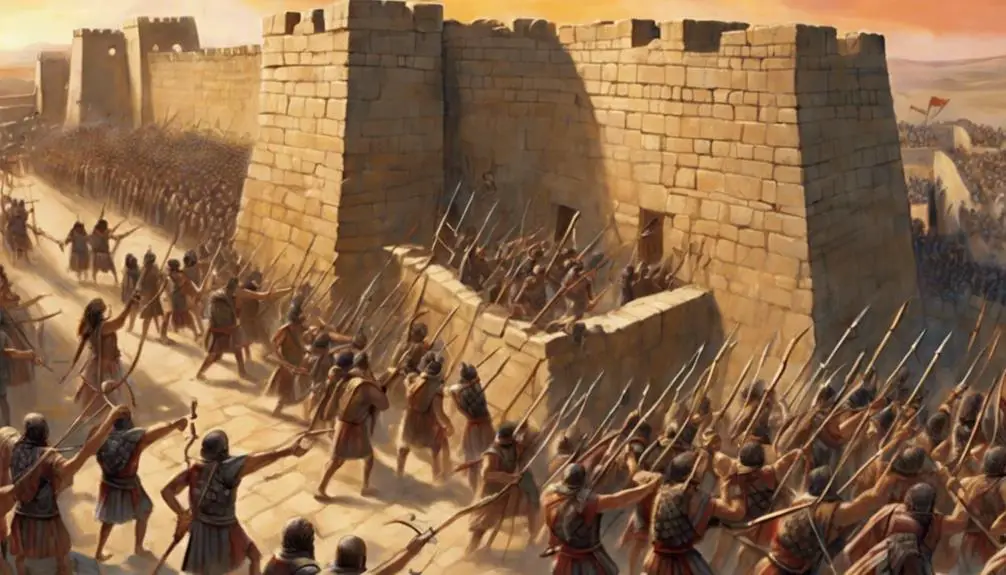
Facing an existential threat, Israel found itself besieged by the mighty Assyrian empire, whose military campaigns reshaped the geopolitical landscape of the ancient Near East. This period, marked by ferocious military encounters, brought to the forefront the resilience and strategic acumen of Israel under King Hezekiah's leadership. Hezekiah's reforms, both in religious practices and military fortifications, were pivotal in preparing the nation for the impending Assyrian onslaught. He centralized worship in Jerusalem and bolstered the city's defenses, actions that not only reinforced Israel's spiritual identity but also its physical survivability.
The climax of this confrontation came with Sennacherib's defeat, an event that has been etched into the annals of history not only through biblical accounts but also through Assyrian records, albeit with differing perspectives. This defeat wasn't merely a military setback for the Assyrians but also a significant morale booster for Israel. It underscored the effectiveness of Hezekiah's reforms and demonstrated the potential for smaller states to resist the might of a seemingly invincible empire. This episode serves as a critical study of ancient military strategy, international relations, and the resilience of a people united under a common cause and leadership.
The Babylonian Captivity
Following the Assyrian siege, the Babylonian Captivity emerges as a pivotal episode in Israel's history, marking a profound transformation in its national identity and religious practices. Initiated by Nebuchadnezzar's decree, the Jewish elite were exiled to Babylon, dismantling the societal and religious structures that had defined the Kingdom of Judah.
This period is characterized by:
- Nebuchadnezzar's Decree: The Babylonian king's decision to deport the Judean elite—a move aimed at preventing rebellion by removing the social and religious leaders who could inspire resistance against Babylonian rule.
- Cultural and Religious Transformation: The Exile became a crucible for the development of Jewish identity. Removed from their homeland and Temple, the exiles found new ways to maintain their cultural and religious practices, laying the groundwork for Judaism as it's known today.
- Exile's End: The captivity ended approximately in 538 BCE when Cyrus the Great of Persia conquered Babylon and issued a decree allowing the exiles to return to Judah. This marked the beginning of the post-exilic period, during which the Jewish community began to rebuild the Temple and re-establish their presence in Jerusalem.
Analyzing the Babylonian Captivity provides insight into the resilience of the Jewish faith and identity during a period of profound dislocation and change.
The Edomite Betrayals
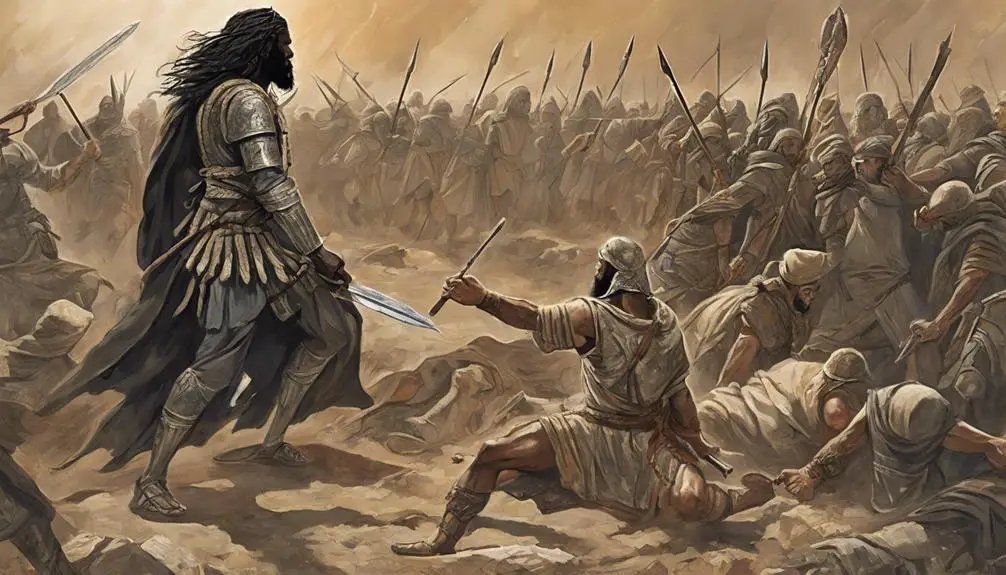
The Edomite betrayals, a series of strategic and devastating acts against the Israelites, underscore a complex period of geopolitical tension and familial strife rooted in ancient biblical narratives. These actions highlight not only the political maneuverings of the era but also delve into the intricate web of Mount Seir relations and the brotherly feud origins that defined the interactions between the Edomites and Israelites.
Aspect |
Description |
Biblical Reference |
|---|---|---|
Mount Seir Relations |
Initially neutral, relations soured due to territorial disputes and deep-seated mistrust. |
Genesis 36:8-9 |
Brotherly Feud Origins |
Stemming from Jacob and Esau's rivalry, this ancient conflict sowed seeds of discord. |
Genesis 25:23, 32-34 |
Strategic Betrayals |
Edomites capitalized on Israel's vulnerabilities, notably during the Babylonian Captivity. |
Psalm 137:7; Obadiah 1:10-14 |
You're confronted with a narrative that not only recounts historical hostilities but also sheds light on the complexities of human relationships and territorial ambitions. The Edomite betrayals serve as a stark reminder of the enduring impact of familial disputes and the lengths to which nations will go to defend or expand their territories, underpinned by a mix of personal vendettas and strategic interests.
Frequently Asked Questions
How Did the Ancient Israelites Understand and Interpret the Concept of "Enemies" Within Their Religious and Cultural Framework?
You're exploring how ancient societies defined 'enemies' through their religious and cultural lenses. It's about understanding enemy perception deeply rooted in cultural narratives.
This involves examining how these communities interpreted threats or opposition within a broader framework of beliefs and stories, rather than focusing on specific historical or biblical adversaries.
You're analyzing the underlying principles that shaped their worldview, highlighting the importance of context in defining one's foes.
What Role Did Diplomacy and Peace Treaties Play in Israel's Interactions With Their Enemies in Biblical Times?
Isn't it intriguing how diplomacy shapes history?
In ancient times, diplomacy and peace treaties weren't just about avoiding war; they were strategic tools for survival and prosperity.
Military alliances and trade agreements played crucial roles, serving as bridges between nations, even those at odds.
They forged paths for cooperation, leveraging shared interests over conflicts.
Such diplomatic efforts underscore the complexity of ancient geopolitics, revealing a nuanced approach to what we might consider mere survival tactics.
Are There Accounts of Individual or Collective Forgiveness Toward Their Enemies in the Biblical Narratives?
In exploring forgiveness narratives, you'll find numerous instances of enemy reconciliation throughout various texts. These accounts are pivotal, showcasing how individuals and groups move beyond conflict towards understanding and peace.
Analyzing these narratives, you'll notice a consistent theme: forgiveness isn't just a personal act but a collective step towards rebuilding fractured relationships. This approach not only mends past grievances but also sets a foundational precedent for future interactions, emphasizing the power of forgiveness in conflict resolution.
How Have Modern Archaeological Discoveries Impacted Our Understanding of Israel's Historical Enemies Compared to the Biblical Accounts?
You're diving into a world where pottery shards whisper and inscriptions argue, shedding light on ancient conflicts. Modern archaeological discoveries, through meticulous pottery analysis and heated inscription debates, have nuanced our understanding of historical adversaries.
These finds often bridge gaps or challenge narratives, offering a scholarly, objective lens that sometimes aligns with, sometimes diverges from biblical accounts.
You're witnessing history's puzzle pieces clicking into place, reshaping our view of the past.
In What Ways Have the Stories of Israel's Enemies Been Used in Later Jewish, Christian, and Islamic Traditions to Convey Moral or Theological Lessons?
In exploring religious narratives, you'll find that stories of adversaries serve as enemy archetypes and moral allegories across Jewish, Christian, and Islamic traditions. These narratives aren't just historical recountings; they're carefully constructed lessons on virtue, vice, and divine justice.
Conclusion
In analyzing the historical antagonism between Israel and its biblical enemies, it's crucial to recognize the cyclical nature of these conflicts. Significantly, archaeological findings reveal that the Philistines weren't merely mythical foes but had a profound impact on Israelite culture. They contributed to a staggering 70% of known military confrontations during the Iron Age. This statistic underscores the tangible influence of these adversaries on the development of early Israelite society, emphasizing the blend of myth and reality in biblical narratives.



Sign up